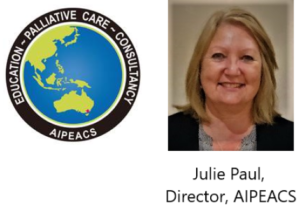
JULIE’S UPDATE: APRIL 2025
前回のアップデートから2ヶ月がたちました。その間に私は2月にあなたの素敵な国を訪問していつものように素晴らしい経験をしました。日本は私にとって第二の故郷のように感じます。オーストラリアにおいては我が家が大洪水に遭い、現在6〜9ヶ月かかる修復の計画をしています。この期間を通じて、私は我が家がいかに大切であり、その環境の中で家族と一緒に過ごす意味について考えさせられました。それらがあなたから奪われると、あなたの生活は変わってしまいます。毎日の日常がもはや無くなってしまいます。私たちの大切な所持品も無くなると、生活は違って感じられます。この体験は、私の生活において何が大切であるかを考えさせられました。現在はこの体験がわたしにとっては重大な事ですが、がんで苦しんでおられる患者さんにとっては、比較的重大ではない事かもしれません。患者さんにとっては人生を変えるような診断に直面して、これからの生き方、今までの人生、そして将来想豫していた人生に深刻な影響を及ぼします。
私たちは2月のアップデートでは、患者さんにとって何が重要であり、何を達成したいとしておられるのかを話し合い、そのケアのゴール達成のためにチーム間のコミュニケーションの重要性について考えました。
今月は、緩和ケアをうけられている患者さんにどのような質問をしたらよいかを考えてみたいと思います。患者さんは一人一人違いますから、患者さんの好ましい状況により色々と異なった質問をする必要があります。忘れてはいけない事は、私たちの最終的な目標は患者さんの生活の質の向上に焦点をあてる事であり、患者さんに残された時間の中で、その目標を達成するには何が重要であるかを明確に示すように援助し、家族やケアチームにも、もし重要であれば、好ましいケアまたは望まないケアを明確に示していくように手助けする事です。ご存知のように、このような会話は患者さんの心の変化や身体状況の変化により詳細な内容が加わる可能性があり、そのためには継続的に行われなければなりません。
私たちが話している事はアドバンス・ケア・プラニングです。そしてより良いプランを考えるためには、緩和ケアを受けている患者さんとその家族と共に人生のこの時期に何がいちばん大切であるかを継続して話し合い、私たちがこのケアプランを確実に取り入れていく事です。チームは、患者さんの他の重要なケア目標と同様にアドバンス・ケア・プラニングにおける患者さんの希望に注意をはらう必要があります。基本的に、これが患者中心のケアなのです。私はいつも、患者さんについて、また患者さんにとって何が重要なのかをもう少し知る事から話し合いを始めたいと思っています。例えば、次のような質問が考えられます。
あなたにとって最大の喜びは何ですか?
- 人生で一番大切な人は誰ですか?
- 普段の生活で大切にしている事はありますか?
- どのように時間を過ごすのが好きですか?
- あなたにとって大切な文化、宗教、家族の伝統はありますか?
これらの質問は、患者さんにとって何が大切なのかを理解するのに役立ち、あなたが患者さん個人を大切に思っていること、患者さんにとって何が大切なのかを聞くことに興味があることを患者さんに感じてもらえる素晴らしい質問です。これらの質問の回答について話し合う時間は、患者さんによって異なります。これがうまくいけば、情報収集のつぎの段階に進むための素晴らしいきっかけとなるでしょう。
次回は、患者さんが将来どのような医療を受けたいか、あるいは受けたくないかについて、どのような質問をして患者さんの希望を引き出すかについて、もう少し詳しくお話しします。
アドバンス・ケア・プラニングの概念に初めて触れる方、あるいは概念を再確認したい方は、添付のリンクをクリックして、オーストラリアの視点からの概要をご覧にください。
https://www.youtube.com/watch?v=84rkuQBdY-s You Tube のビデオを開いたあと、設定をクリックすると、自動翻訳をクリックして、英語から日本語の字幕に変更することができます。緩和ケアに関するあなたの考えや経験を分かち合い、お互いに学び続けられることを楽しみにしています。
お元気で。
Julie
Julie Paul
-
Disclaimer: April 2025 免責条項:
Julie’s Update シリーズ内の内容につき正確な情報の提供に細心の注意を注いでいますが、特にある事柄についての専門的意見を提供するものではありません。このシリーズに含まれる情報は、独立した専門家の見解に取って代るものではありません。また、医療上の助言として利用したり、何らかの疾患の治療、手当、又は、予防のために使用されるものではありません。
このシリーズにより提供される情報の利用、依存によるいかなる法的責任、怪我、紛失、損害については、責任は負いません 。
-
Julie’s Update: April 2025(原文) -
-
It has been 2 months since the last update and in that time I have visited your lovely country in February which was a wonderful experience, as always. For me Japan feels like a second home. In Australia we have been managing major flood damage to our home which now has a plan in place which will occur over the next 6-9 months. During this time, it has reminded me of what is important to me which is the family home and what is means to spend time together in this environment. When this is taken away from you, your life changes. What was “normal” in day to day living no longer occurs. Our treasured belongings may not be salvageable and life just feels different. It has made me reflect on life and what is important. Now my experience is major to me, but is minor when we consider our palliative care patients who are confronting a life changing diagnosis which potentially is having a profound effect on who they are as a person, the type of life they once knew and the life they imagined they would be having in the future.
-
We reflected in the February update about the importance of talking to our patients about what is important to them, what they would like to achieve and the importance of communicating this within the team as part of our goals of care.
-
This month I would like to reflect on the types of questions you might consider discussing with your palliative care patients. Remember every patient is different so we need a variety of different questions that we may ask depending on the preference of the patient. Please remember, ultimately our goal is to focus on quality of life for the patient and support them to articulate what is important for them to achieve goals in the period of time they have left, and to help them articulate to their families and the health care team about the type of care they do or don’t want, if that is important to them. As we know these types of conversations are ongoing as our patients may change their mind and add more detail as time goes on and their medical situation changes.
-
What we are talking about is advance care planning. However, I think a better way to think about this is simply that we are having ongoing discussions with our palliative care patients and their families about what is important to them at this time in their life, and ensuring we incorporate this in our care planning. The team needs to be aware of the patient’s wishes for advance care planning, the same as we do for any other goals that are important to the patient’s care. Basically this is just good patient centered care.
-
I always like to begin these discussions by getting to know a little bit more about the patient and what matters to them. The sorts of questions you might consider include:
- What brings you the greatest joy?
- – Who are the most important people in your life?
- – Are their aspects of your usual routines that are important to you?
- – How do you like to spend your time?
- – Are there any cultural, religious or family traditions that are important to you?
These are great questions that will help you understand what is important to your patients and will give the patient a sense that you care about them as individuals and you are interested in hearing about what is important to them. The time it takes to discuss their responses to these questions will depend on the patient. If we do this well it will be a great segway into the next phase of information gathering.
-
-
Next month we will talk a little bit more about the types of questions you might ask to elicit the patient’s preferences about the types of medical care they do or don’t want in the future.
-
For those that are new to the concept of advance care planning or would like to refresh the concept please press on the attached link for an overview from an Australian perspective. https://www.youtube.com/watch?v=84rkuQBdY-s If you click on settings once you open the You Tube video you can click on auto translate and change it from English to Japanese subtitles.
-
Please let me know how you are going, as we enjoy sharing your thoughts and experiences on palliative care, so that we can continue to learn from each other.
-
Stay safe and take care.
Julie
Julie Paul
-
-
